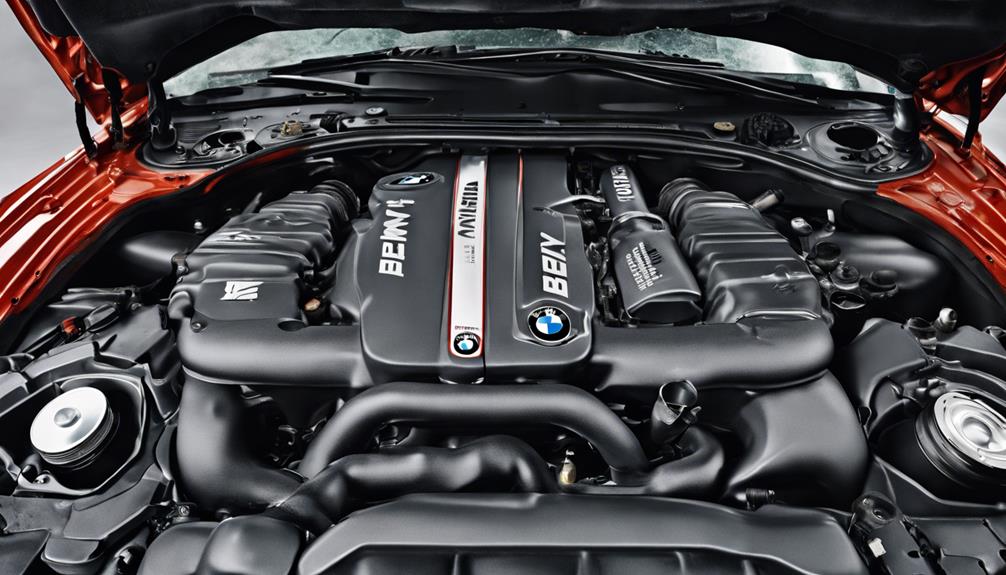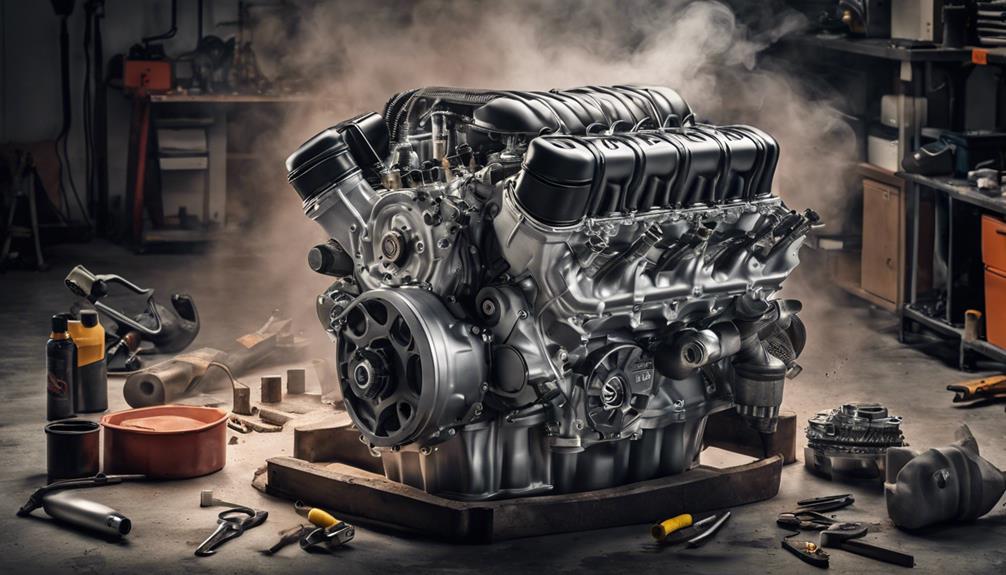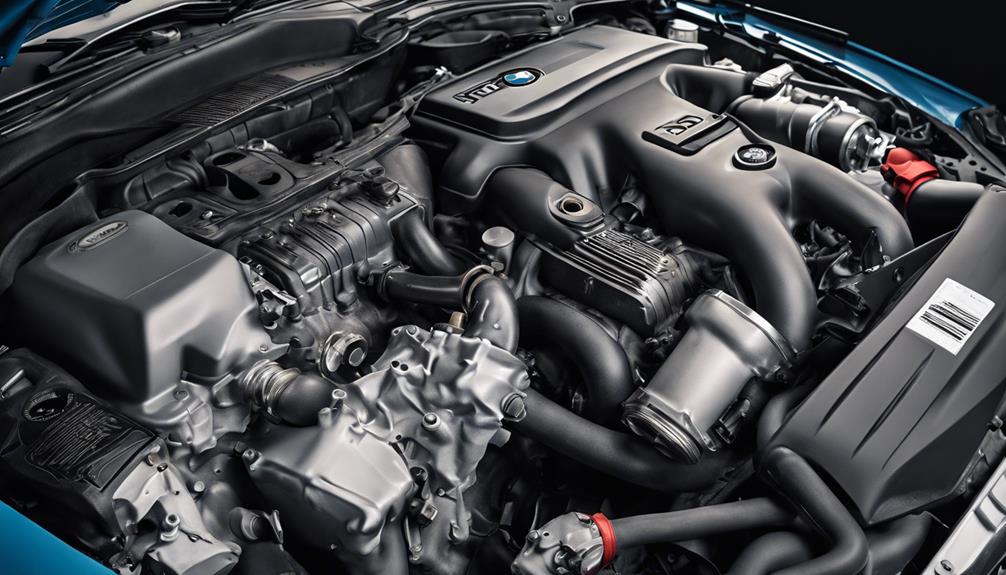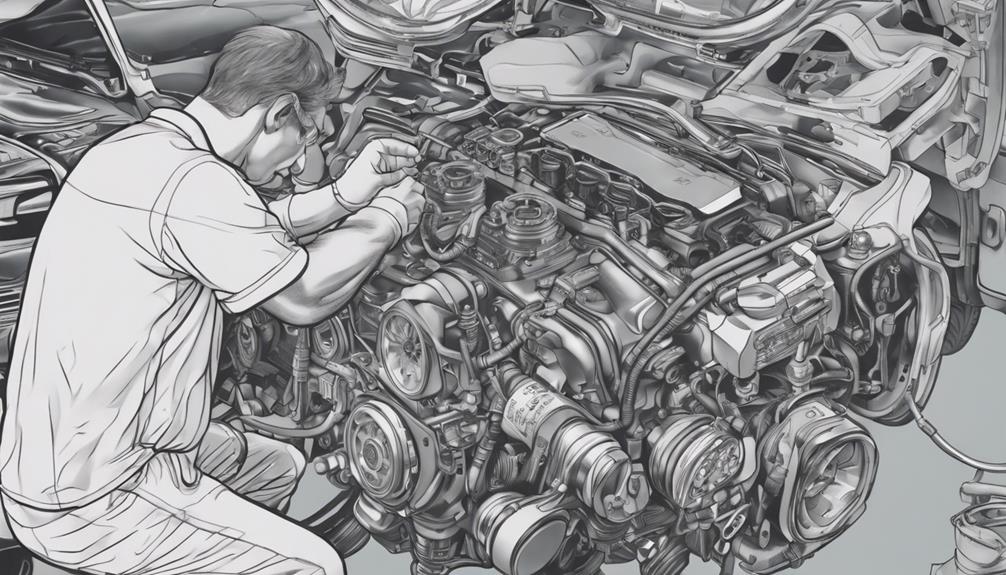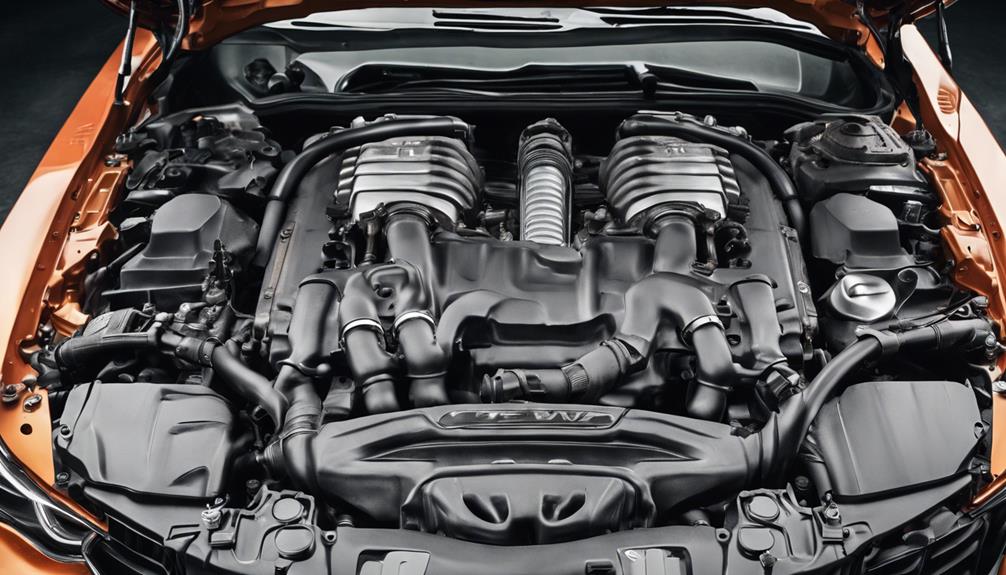So, you consider yourself a BMW M57 engine owner, do you? Well, let's delve into this wonderful world of mechanical marvels and surprises! Brace yourself for crankshaft pulley hiccups, quirky EGR valve challenges, and the thrilling rollercoaster that is DPF malfunctions. Oh, and let's not forget the swirl flap saga and the glow plug gossip. Proper injector care, turbocharger TLC, and oil change rituals are all part of the engine opera. Just remember, the adventure doesn't stop here!
Key Takeaways
- Common issues: swirl flap complications, glow plug malfunctions, and EGR valve concerns.
- Importance of regular maintenance for prevention and performance.
- Monitoring DPF for clogs and regeneration, crucial for engine health.
- Watch for belt problems, crankshaft pulley issues, and injector malfunctions.
- Turbocharger maintenance is vital, check for leaks and ensure proper lubrication.
Common Crankshaft Pulley Issues
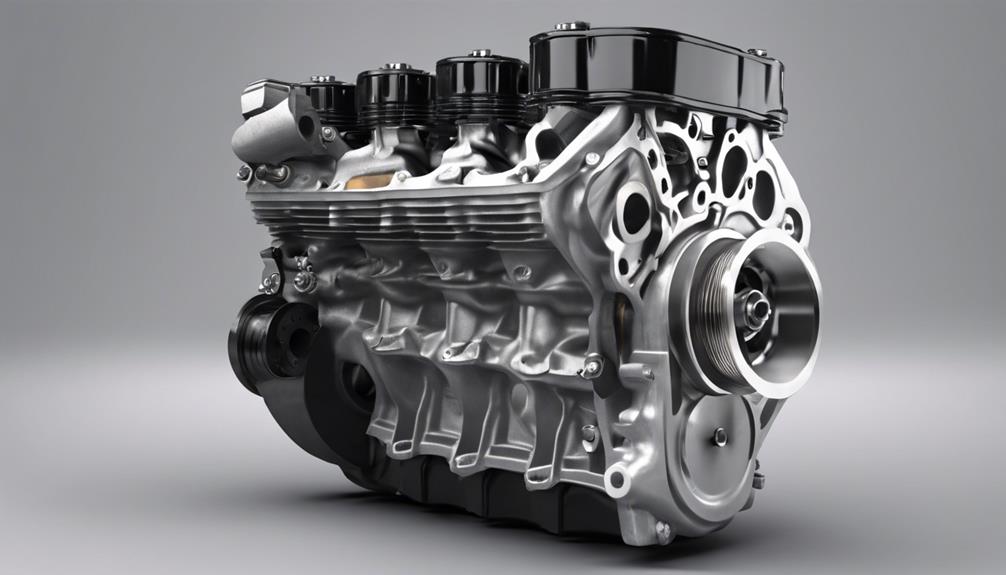
Imagine this: your BMW M57 engine belt singing a tune that's not on the radio, chances are you're dealing with one of those pesky crankshaft pulley issues. These problems can lead to all sorts of woes, from timing mishaps to accessory drive system shenanigans.
Envision this: your engine idling like a purring kitten, and suddenly, it starts growling like a disgruntled bear. That's the kind of chaos a failing crankshaft pulley can bring into your life.
Now, let's get technical. The crankshaft pulley is like the conductor of an orchestra, keeping all engine components in harmony. But when it decides to throw a tantrum, you might notice engine vibrations, unusual noises, or belts slipping like a banana peel on a cartoon character. To avoid this melodrama, stay on top of oil changes, keep an eye on glow plugs, and give your intake manifold some love. Remember, freedom comes from a well-behaved engine, so show that crankshaft pulley who's boss!
Troubleshooting EGR Valve Problems
Now, let's address those EGR valve problems in your BMW M57 engine, where troubleshooting becomes a symphony of carbon buildup inspections and valve functionality tests. The EGR valve, a crucial component in reducing emissions, can sometimes get clogged with oily gunk, causing issues like rough idling and decreased fuel efficiency in your beloved M57 engine.
To tackle this greasy dilemma, start by checking for carbon deposits resembling a charcoal masterpiece inside the valve. If it's looking more like a BBQ grill than a precision instrument, a thorough cleaning might do the trick.
Next, make sure there are no vacuum leaks playing hide and seek with your engine's performance.
DPF Malfunction Concerns
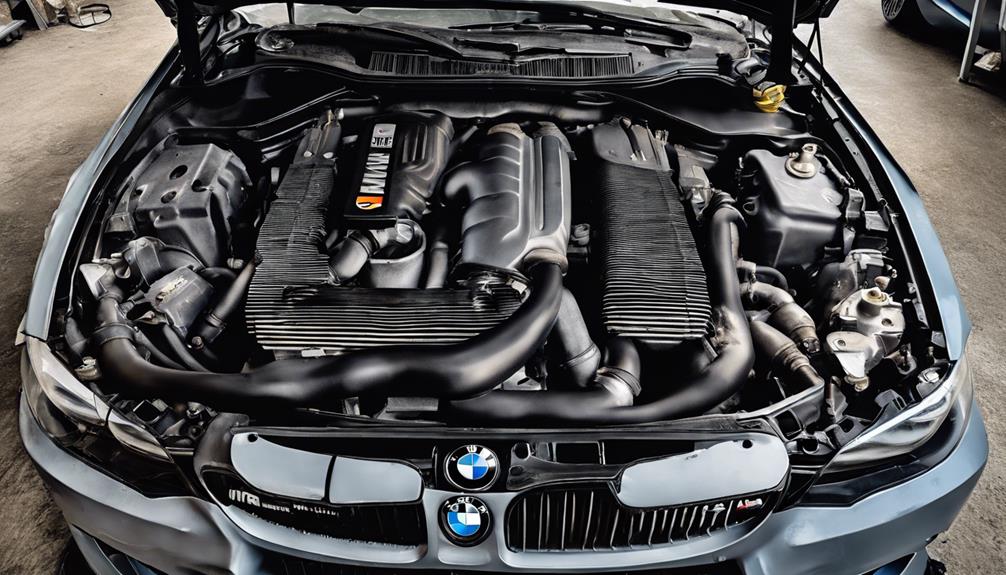
Imagine this: you're cruising down the motorway, feeling the power of your BMW M57 engine, when suddenly, a fault code appears, signaling a potential DPF issue. Here's what you need to know:
- Soot Build-Up: The DPF (Diesel Particulate Filter) can get clogged with soot, leading to reduced performance and increased fuel consumption.
- Regeneration: Driving at high speeds on highways can help regenerate the DPF by burning off accumulated soot, keeping your engine running smoothly.
- Costly Repairs: Ignoring DPF malfunctions can result in expensive repairs or even the need for a replacement, putting a dent in your wallet.
- Preventive Measures: Regular maintenance, using high-quality diesel fuel, and keeping an eye on components like swirl flaps and the oil filter can help prevent DPF issues and keep you on the road to freedom.
Swirl Flap Complications
Cruising down the motorway with your BMW M57 engine roaring, now let's tackle the intricate world of Swirl Flap Complications. The delicate swirl flaps in your BMW M57 engine might seem harmless at first, but beware, these little butterfly valves can turn into big trouble makers if not handled with care. These flaps, nestled in the intake manifold, play an important role in enhancing low-end torque and keeping those emissions in check. However, as time ticks on, these flaps can snap off and take an unexpected journey straight into your engine, leading to catastrophic consequences.
To give you a clearer picture, here's a nifty table detailing the ins and outs of swirl flap complications:
| Issue | Solution | Importance |
|---|---|---|
| Swirl Flap Breakage | Remove or install blanking plates | High |
| Engine Damage Risk | Regular inspection and maintenance | Critical |
| Costly Repairs | Preventative maintenance | Essential |
| Longevity Impact | Monitoring swirl flap conditions | Vital |
| Maintenance Routine | Include swirl flaps in regular checks | Crucial |
Glow Plug Troubles
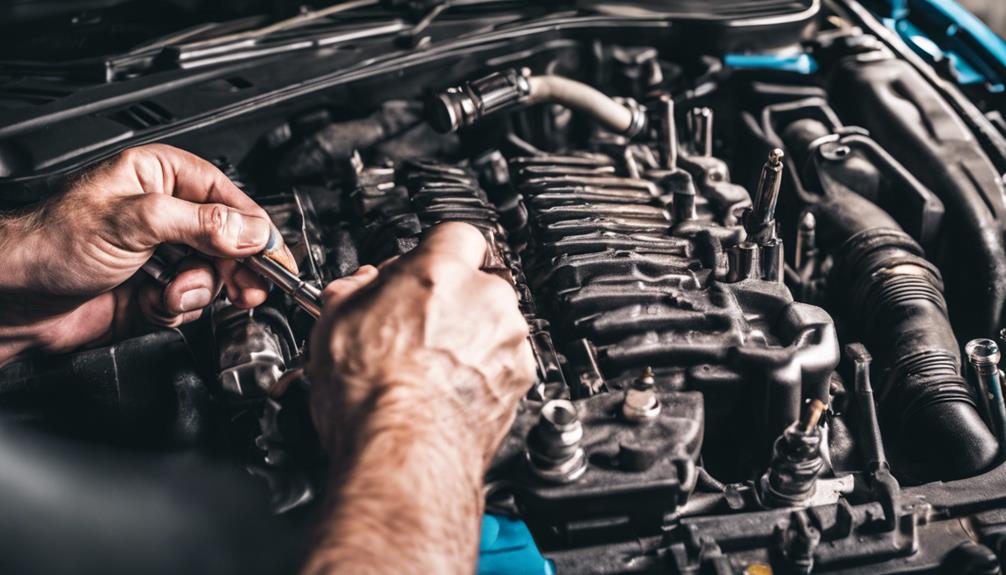
When your BMW M57 engine's glow plugs start causing trouble, you'll find yourself in a chilly predicament that even your heated seats can't solve. These essential components play a vital role in ensuring your engine starts smoothly, especially on frosty mornings. Here's what you need to know about glow plug troubles:
- Cold Start Woes: Faulty glow plugs can make your engine reluctant to start, leaving you stuck in the cold with no quick getaway.
- Rough Idling Drama: When glow plugs misbehave, your engine may throw a tantrum with rough idling, causing vibrations that even your tea can't calm.
- Dashboard Disco: Glow plug issues can trigger warning lights on your dashboard, turning your serene drive into a flashy light show.
- Fuel Efficiency Faux Pas: Neglecting glow plug maintenance can lead to reduced fuel efficiency, burning a hole in your pocket faster than you can say 'cheerio'.
Turbocharger Failures
In the domain of BMW M57 engine woes, turbocharger failures reign as the mischievous culprits behind power loss and smokescreens. When these turbochargers decide to throw in the towel, you'll find yourself limping along the road like a wounded badger, emitting more smoke than a steam engine. The key to keeping these spooling wonders in check lies in regular maintenance and swift action at the first sign of trouble. Check your oil levels and quality regularly, for a dry turbo is a sad turbo indeed. Below is a table summarising turbocharger failures in the BMW M57 engines:
| Symptom | Description | Action |
|---|---|---|
| Loss of power | Engine struggles to perform as usual | Check for leaks and worn components |
| Excessive smoke from exhaust | Smoke billows out like a faulty smoke machine at a rock concert | Seek professional inspection and repair |
| Unusual engine noises | Strange sounds emanate from under the bonnet | Address issues promptly to prevent damage |
Crankcase Ventilation Breather Maintenance
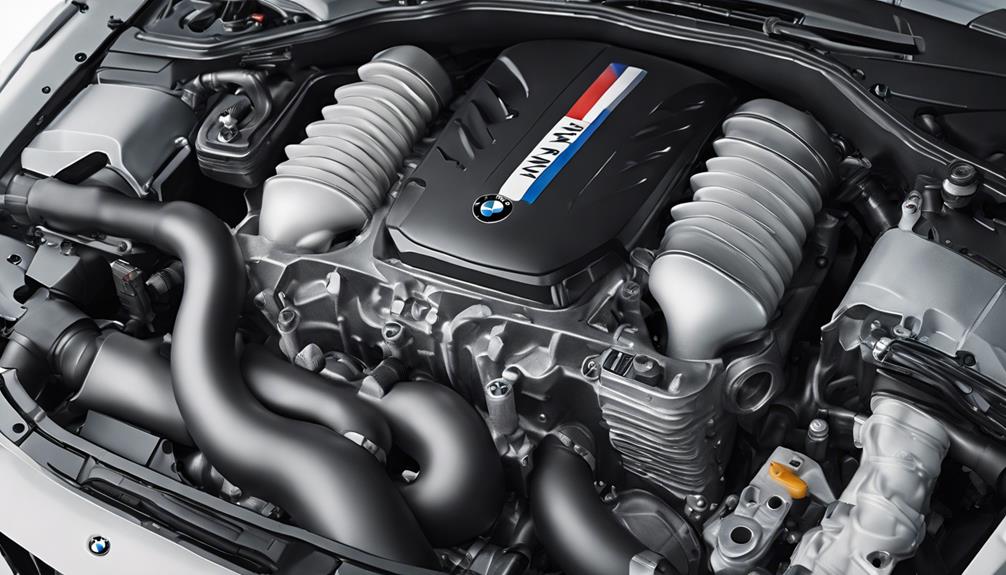
Alright, mate, let's talk about the essential bits of maintaining your BMW M57 engine's crankcase ventilation breather.
This little contraption helps keep your engine running smoothly by regulating pressure and clearing out unpleasant gases. Neglecting its care could leave you with a right mess of oil leaks and a grumpy engine, so give it some love to avoid a costly headache down the road.
Breather Valve Function
Make sure that the crankcase ventilation breather valve in your BMW M57 engine is regularly maintained to prevent potential issues and maintain peak performance.
Here are some important facts about the breather valve function:
- The breather valve aids in maintaining proper crankcase ventilation.
- It prevents pressure build-up and vents out harmful gases.
- Malfunctioning can lead to oil leaks, rough idling, and decreased efficiency.
- Regular maintenance is essential for top engine performance.
Signs of Clogging
Guarantee your BMW M57 engine remains in excellent condition by keeping an eye out for clear indications of blockage in the crankcase ventilation breather system. Clogging can cause a right old mess in your engine, leading to increased pressure that can make your car feel like it's dragging a ball and chain. Watch out for oil leaks, power loss, and your wallet feeling lighter due to increased fuel consumption.
Regular maintenance of the breather system is the key to avoiding a costly breakdown. Don't let a clogged breather rain on your parade; cleaning or replacing the breather filter can bring back the fresh air your engine craves. Stay ahead of the game by inspecting the breather system regularly for any signs of trouble.
Importance of Maintenance
To maintain peak performance in your BMW M57 engine, ensuring the proper upkeep of the crankcase ventilation breather system is as important as sipping a cup of tea on a rainy day. Neglecting this essential component could lead to a cascade of issues quicker than you can say 'cheerio'. Here's why it's critical:
- Removes harmful gases: Like a trusty chimney sweep, the breather system clears out nasty emissions from your engine.
- Prevents pressure build-up: No one likes a pressure cooker situation; the breather system keeps your engine from blowing a gasket.
- Ensures peak performance: Keep your engine purring like a contented kitten by maintaining the breather system.
- Avoids costly repairs: Neglect could lead to wallet-draining damages; a bit of maintenance now saves pounds later.
Injector Problems and Solutions
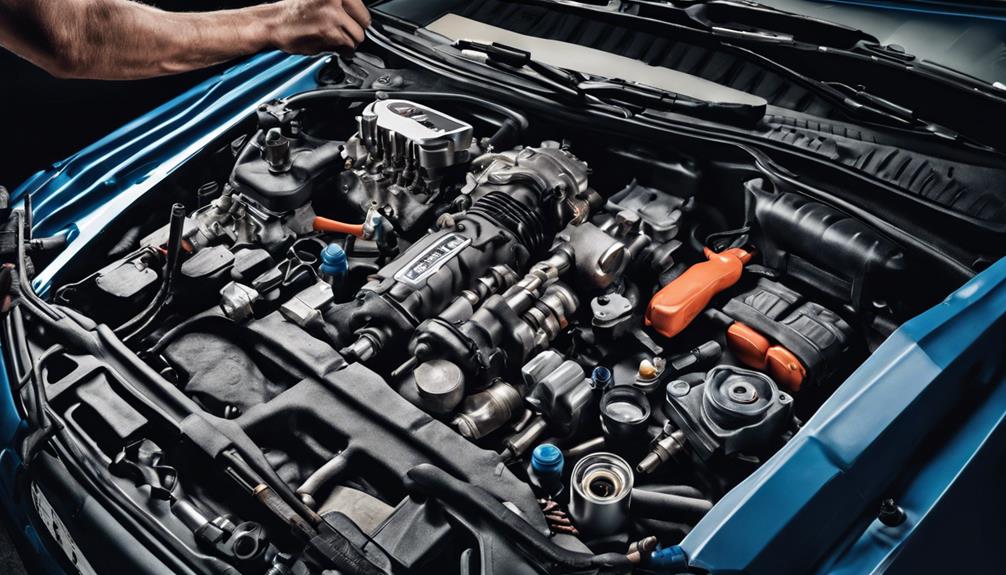
When your BMW M57 engine starts idling like a shaky teacup ride at the fair, chances are those injectors are due for a bit of TLC. Over time, these injectors can wear out, causing issues with fuel delivery and engine performance. Symptoms of injector problems include rough idling, misfires, decreased fuel efficiency, and loss of power. To tackle these gremlins, consider cleaning or replacing the injectors to restore proper fuel atomization and combustion. Remember, regular maintenance is key! Using high-quality fuel and additives can help prevent premature injector wear and ensure your engine purrs like a contented kitten.
| Injector Problems and Solutions |
|---|
| Rough idling |
| Misfires |
| Decreased fuel efficiency |
| Loss of power |
| Cleaning or replacing injectors |
For a hassle-free experience, seek professional diagnosis with specialized tools to accurately identify and address any injector woes. Keep your BMW M57 engine running smoothly with a little love and attention to those essential injectors!
Turbocharger Upkeep Tips
Keep your turbocharger singing like a finely-tuned symphony with these essential upkeep tips:
- Regularly check for oil leaks: Just like a detective on the case, investigate any sneaky oil leaks around your turbocharger. Keeping things leak-free guarantees proper lubrication, preventing any potential damage in the long run.
- Monitor boost pressure levels: Keep an eagle eye on those boost pressure levels. Any deviations could be a sign of trouble brewing in the turbocharger's performance. Stay ahead of the game and nip issues in the bud.
- Allow for cool-down time: After a spirited drive, give your turbocharger a breather. Allowing it to cool down helps prevent oil coking and ensures a longer lifespan. Think of it as a cool-down lap for your turbo.
- Inspect the wastegate and actuator: Take a peek at the turbocharger's wastegate and actuator. Make sure they're functioning correctly and properly adjusted for that sweet spot of peak boost control. It's like fine-tuning a musical instrument – precision is key!
Recommended Oil Change Frequency
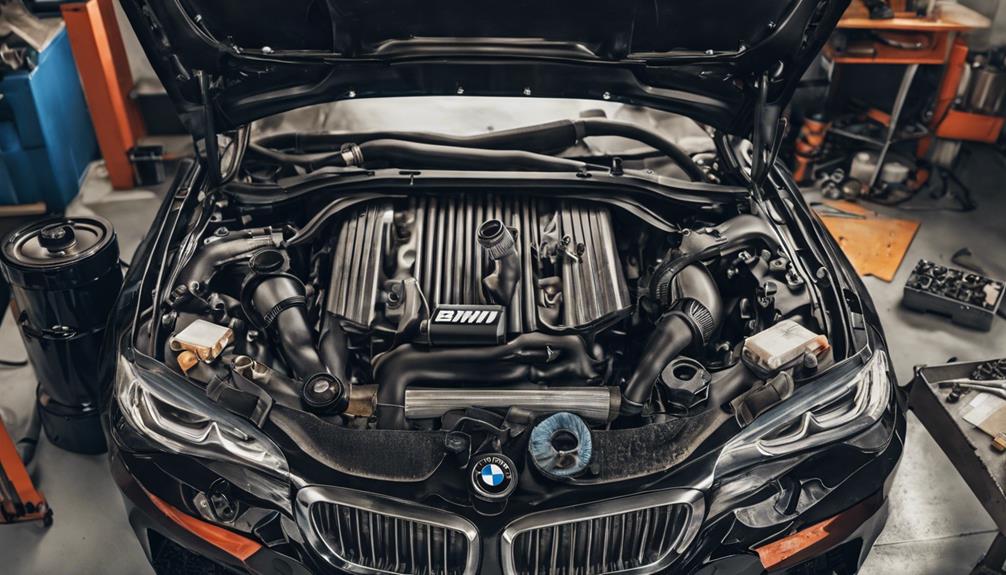
You should stick to the recommended oil change interval for your BMW M57 engine to keep it running smoothly. Neglecting this maintenance task could lead to engine troubles down the road, and nobody wants that headache.
Oil Change Interval
For the peak performance and durability of your BMW M57 engine, follow the suggested oil change interval of every 10,000 miles or yearly as recommended by BMW. Remember, a well-oiled engine is a happy engine!
Here's why maintaining the proper oil change interval is important:
- Regular oil changes prevent premature wear on engine components.
- Proper lubrication guarantees the engine runs smoothly.
- Fresh oil keeps the engine clean and reduces friction.
- Following the recommended frequency improves overall engine efficiency.
Engine Health Maintenance
To maintain peak engine health for your BMW M57, adhere to the recommended oil change frequency of every 10,000 miles or annually. Neglecting this crucial maintenance can result in increased friction, heat buildup, and potential engine damage over time. Regular oil changes are like giving your engine a spa day – they help prevent premature wear on components like turbochargers and injectors, ensuring they stay cool, calm, and collected. Fresh oil acts as the lifeblood of your engine, providing essential lubrication, cooling, and cleaning to keep things running smoothly. So, treat your BMW M57 to a regular oil change schedule, and it will reward you with purring performance for miles to come.
| Benefits of Regular Oil Changes | |
|---|---|
| Prevents premature wear | Guarantees proper lubrication |
| Prevents engine damage | Assists in cooling |
| Promotes ideal performance | Cleans internal parts |
EGR System Inspection Guidelines
Examine the EGR system of your BMW M57 engine with care and meticulousness to guarantee peak performance and minimized emissions. When inspecting the EGR system, remember these essential guidelines:
- Check for Clogs: Make sure there are no blockages in the EGR system that could hinder the recirculation of exhaust gases.
- Inspect for Carbon Buildup: Keep an eye out for excessive carbon deposits that may impede the system's functionality.
- Look out for Malfunctions: Be vigilant for any signs of EGR system malfunctions that could affect engine efficiency.
- Monitor Symptoms: Pay attention to rough idling, decreased fuel efficiency, or increased emissions during testing as potential indicators of EGR system issues.
Frequently Asked Questions
Is the BMW M57 Reliable?
You'd best tread carefully with the BMW M57; reliability can be a bit touch and go. Swirl flap issues, turbocharger troubles, injector wear, and glow plug woes are no strangers to this engine.
How Long Does an M57 Engine Last?
You can expect the BMW M57 engine to last over 200,000 miles with proper care. Regular maintenance, timely repairs, and keeping a close eye on key components can help extend its lifespan.
Which Is Better N57 or M57?
When deciding between N57 or M57, opt for N57 for improved efficiency and tech. N57's piezo injectors enhance performance, while its DPF guarantees cleaner emissions. Choose wisely for a smoother, more advanced ride.
Which BMW Uses M57 Engine?
You'll find the BMW M57 engine powering various models like the 3-Series, X3, and X5. Known for its performance and efficiency, this straight-six diesel engine packs a punch with its power and torque delivery.





